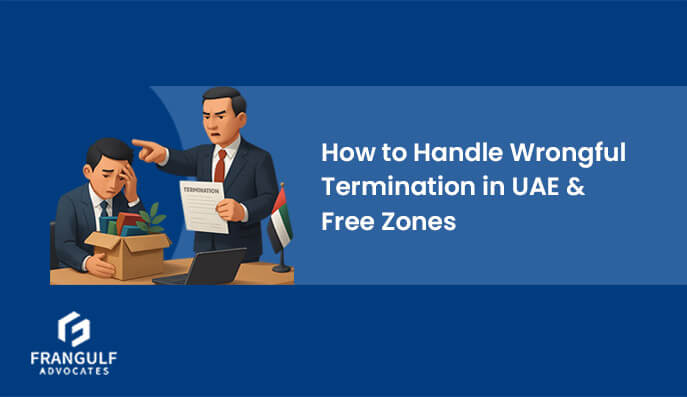How to File for Divorce in Dubai: Process, Custody & Legal Requirements

Table of Contents
- Understanding Dubai’s Divorce Laws in 2025
- Who Can File for Divorce in Dubai
- Step-by-Step Process: How to File for Divorce in Dubai
- Required Documents for Dubai Divorce Filing
- Costs of Filing for Divorce in Dubai
- Child Custody and Support in Dubai Divorce Cases
- Property Division and Asset Distribution
- Spousal Support and Alimony
- Special Considerations for Expatriates
- Working with Professional Legal Support
- Timeline for Dubai Divorce Proceedings
- Common Challenges and How to Overcome Them
- Protecting Your Rights During Divorce
- Life After Divorce: Moving Forward
- Need Expert Legal Guidance?
- Need Expert Divorce Legal Support?
- Got a Question?
Filing for divorce in Dubai can feel overwhelming, especially when you’re already dealing with the emotional stress of ending a marriage. Whether you’re a UAE national or an expatriate living in Dubai, understanding the legal process is crucial for protecting your rights and achieving a fair resolution.
This comprehensive guide walks you through every step of the divorce process in Dubai, from initial filing to final judgment, including recent legal changes that came into effect in 2025.
Understanding Dubai’s Divorce Laws in 2025
Dubai’s divorce system operates under both Islamic Sharia law and civil law frameworks, depending on your nationality and religious background. The introduction of the new divorce law UAE has made it easier for expatriates to apply the laws of their home country instead of Sharia law in certain cases.
Key Changes in 2025
Recent legislative updates have significantly impacted divorce procedures in Dubai. Mandatory Documentation: Husbands must now officially document any divorce or reconciliation within 15 days. Failure to do so permits the wife to claim compensation equivalent to alimony. This change ensures better protection for spouses and clearer legal documentation.
For expatriates, the new laws provide more flexibility in choosing which legal system applies to their divorce proceedings. Non-Muslim expatriates can now opt to have their divorce governed by the laws of their home country, which can significantly impact asset division and custody arrangements.
Who Can File for Divorce in Dubai
Both UAE nationals and expatriates can file for divorce in Dubai, provided they meet certain residency requirements. You can initiate divorce proceedings in Dubai if:
- You were married in the UAE
- You have been residing in Dubai for at least one year
- Your spouse is a UAE resident
- The marriage was registered with UAE authorities
Understanding these eligibility criteria is essential before beginning the legal process, as attempting to file without meeting these requirements can result in case dismissal and unnecessary legal costs. For expert guidance on eligibility requirements contact our family law specialists.
Step-by-Step Process: How to File for Divorce in Dubai
Step 1: Register Your Case at the Family Guidance Section
The first step is to register the case by either party at the Family Guidance Section at the respective judicial department, in one of the emirates. This initial registration is mandatory for all divorce cases in Dubai.
When registering your case, you’ll need to provide:
- Original marriage certificate (with Arabic translation if necessary)
- Valid passport copies for both spouses
- Emirates ID copies
- Proof of Dubai residency
- Any relevant supporting documents
Step 2: Mandatory Mediation and Counseling
A court appointed conciliator will try to reconcile the divorcing parties. The conciliatory procedure is a mandatory process of the divorce proceedings in the UAE. This mediation phase serves multiple purposes:
- Attempts to resolve marital issues through counseling
- Provides a neutral environment for discussion
- Allows both parties to express their concerns without legal representatives present
- Can result in amicable settlement without court proceedings
Many couples find this stage valuable, even if reconciliation isn’t possible, as it helps establish ground rules for the divorce proceedings and can lead to more cooperative negotiations.
Step 3: Obtaining the Referral Letter
If mediation fails and one or both parties remain determined to proceed with divorce, the conciliator will issue a referral letter. The letter can be submitted to court at any time within three months from the date of issue. This three-month window is crucial – failing to submit within this timeframe means you’ll need to restart the entire process.
Step 4: Court Hearings
Once you submit the referral letter to court, formal divorce proceedings begin. Once in court, the particulars of the divorce case fall at the court’s discretion and each party has to provide evidence to support their own claims against one another as well as in their own defence.
During court proceedings, the judge will consider:
- Grounds for divorce
- Child custody arrangements
- Financial settlements
- Property division
- Alimony or spousal support
Having experienced family lawyers in Dubai during this stage is invaluable, as they can present your case effectively and ensure all legal requirements are met.
Step 5: Court Hearings and Evidence Submission
Divorce cases in Dubai may involve multiple hearings, depending on the complexity of the matter. Both parties are required to submit evidence, documents, and witness testimonies (if relevant).
The judge may:
- Request additional documents
- Order further counseling or mediation
- Temporarily assign custody or support until a final decision is made
Step 6: Final Judgment and Divorce Decree
Once the hearings are completed, the court issues a final divorce judgment. The decree outlines:
- Custody arrangements and visitation rights
- Child support and financial responsibilities
- Alimony or spousal maintenance
- Division of jointly owned assets or property
This decree is legally binding and enforceable in Dubai.
Step 7: Execution and Registration of Divorce
After the judgment, the divorce must be registered and executed through Dubai Courts. For expatriates, it may also need to be attested at their embassy or consulate for recognition in their home country.
This final step ensures the divorce is officially recognized both in the UAE and internationally (if required).
Required Documents for Dubai Divorce Filing
Proper documentation is critical for a successful divorce filing. Here’s what you’ll need:
Primary Documents
- Marriage certificate (original and Arabic translation)
- Valid passports for both spouses
- Emirates ID cards
- Proof of Dubai residency (utility bills, rental agreements)
- Birth certificates for any children
- Financial statements and bank records
Additional Documents (if applicable)
- Pre-nuptial agreements
- Property ownership documents
- Investment portfolios
- Business registration documents
- Medical reports (if relevant to the case)
Ensure all foreign documents are properly attested by your embassy and the UAE Ministry of Foreign Affairs (MOFA) and translated into Arabic by certified translators. Missing or improperly prepared documents can significantly delay your case.
Costs of Filing for Divorce in Dubai
Understanding the financial implications of divorce proceedings helps you budget appropriately. Typical legal fees for an amicable, uncontested divorce range from approximately Dh20,000 to Dh40,000. However, costs can vary significantly based on case complexity.
Breakdown of Potential Costs
Court Fees and Administrative Costs:
- Initial filing fees: AED 1,000 – 3,000
- Document translation and attestation: AED 2,000 – 5,000
- Court hearing fees: AED 500 – 1,500 per hearing
Legal Representation: Legal fees which can vary from AED 12,000 to AED 20,000 (depending on the circumstances and any agreement between the parties) for straightforward cases. Complex cases involving significant assets or custody disputes can cost considerably more.
Additional Expenses:
- Expert witness fees (if required)
- Property valuation costs
- Mediation fees
- Appeal costs (if applicable)
Working with experienced civil lawyers can help you understand the full scope of potential costs and budget accordingly. Our legal consultancy services include transparent fee structures and detailed cost breakdowns for all family law matters.
Child Custody and Support in Dubai Divorce Cases
Child custody matters are particularly sensitive in Dubai divorce proceedings. The courts prioritize the best interests of the child while considering Islamic principles and, for expatriates, potentially the laws of their home country.
Custody Arrangements
Under traditional UAE law, mothers typically receive custody of young children (boys under 11, girls under 13), while fathers maintain financial responsibility. However, recent legal reforms allow for more flexible arrangements, especially for expatriate families.
For detailed information on custody arrangements, read our comprehensive guide on what UAE family law covers.
Child Support Obligations
If the father cannot provide support, the mother is required to contribute, with the right to seek reimbursement. The father must cover legal document expenses for the child, including passport and ID renewals.
Factors considered in determining child support include:
- Both parents’ income and financial capacity
- Child’s needs and lifestyle
- Educational expenses
- Healthcare costs
- Housing requirements
Property Division and Asset Distribution
Asset division in Dubai divorces depends largely on the applicable law and the couple’s circumstances. Under UAE law each party simply retains the assets and property held in their names (unless in Dubai where the new laws allow expats to apply the law of the country in which they were married).
Marital Assets vs. Separate Property
The courts distinguish between:
- Marital assets: Property acquired during marriage
- Separate property: Assets owned before marriage or received as gifts/inheritance
- Joint property: Assets held in both names
For expatriates choosing to apply their home country’s laws, the division principles may differ significantly, potentially allowing for more equitable redistribution regardless of whose name assets are held in.
Spousal Support and Alimony
Alimony arrangements in Dubai vary based on the applicable legal framework and individual circumstances. Factors considered include:
- Length of marriage
- Both parties’ financial situations
- Standard of living during marriage
- Earning capacity and employability
- Contributions to the marriage (financial and non-financial)
Recent legal changes have clarified wives’ rights to compensation if proper divorce documentation isn’t filed within required timeframes, providing additional protection for spouses.
Special Considerations for Expatriates
Expatriates face unique challenges when filing for divorce in Dubai. Understanding these can help you make informed decisions:
Choice of Law
Non-Muslim expatriates can often choose between UAE law and their home country’s law. This decision significantly impacts:
- Asset division principles
- Child custody arrangements
- Spousal support obligations
- Property rights
Recognition of Foreign Divorces
If you’re considering divorcing in your home country instead of Dubai, ensure the divorce will be recognized in the UAE. Proper legal consultation is essential to avoid complications with residency status or future legal matters.
Working with Professional Legal Support
Given the complexity of Dubai’s divorce laws and the significant personal and financial implications, professional legal representation is strongly recommended. Experienced family law attorneys can:
- Explain your rights under applicable laws
- Prepare and file necessary documentation
- Represent you in mediation and court proceedings
- Negotiate favorable settlements
- Ensure compliance with all legal requirements
When choosing legal representation, look for attorneys with specific experience in Dubai family law and a track record of successful outcomes in cases similar to yours.
Timeline for Dubai Divorce Proceedings
The duration of divorce proceedings in Dubai varies considerably based on case complexity and whether the divorce is contested or uncontested:
Uncontested Divorce
- Mediation phase: 2-4 weeks
- Court proceedings: 2-4 months
- Total timeline: 3-6 months
Contested Divorce
- Mediation attempts: 1-2 months
- Court proceedings: 6-18 months
- Appeals (if applicable): Additional 6-12 months
- Total timeline: 1-3 years
Complex cases involving significant assets, custody disputes, or international elements may take longer.
Common Challenges and How to Overcome Them
Documentation Issues
Incomplete or improperly prepared documents are the most common cause of delays. Work with experienced professionals to ensure all paperwork is correctly prepared and submitted.
Language Barriers
All court proceedings in Dubai are conducted in Arabic. Ensure you have qualified interpreters and that all documents are properly translated by certified translators.
Cultural Differences
Understanding local customs and legal traditions can impact your case’s success. Professional legal representation helps navigate these cultural nuances effectively.
Financial Complications
Complex financial situations, especially those involving international assets, require careful handling. Consider working with financial advisors alongside your legal team.
Protecting Your Rights During Divorce
Throughout the divorce process, it’s crucial to protect your rights and interests:
Financial Protection
- Maintain detailed records of all assets and debts
- Avoid making significant financial decisions without legal consultation
- Consider temporary financial arrangements during proceedings
- Protect your credit and financial accounts
Communication Guidelines
- Keep all communication with your spouse respectful and documented
- Avoid discussing case details on social media
- Channel all legal communications through your attorney
- Maintain privacy regarding sensitive case information
Child Welfare
- Prioritize your children’s emotional and physical well-being
- Maintain stable routines during the divorce process
- Consider professional counseling support for children
- Avoid involving children in legal disputes
Life After Divorce: Moving Forward
Successfully completing divorce proceedings in Dubai marks the beginning of a new chapter. Consider these important steps:
Legal Finalization
- Ensure all court orders are properly executed
- Update legal documents (wills, insurance policies, etc.)
- Notify relevant authorities of status changes
- Maintain copies of all legal documents
Financial Reorganization
- Review and update insurance coverage
- Reassess financial goals and budgets
- Consider professional financial planning assistance
- Understand ongoing financial obligations
Child Arrangements
- Implement custody and visitation schedules
- Establish clear communication channels with your ex-spouse regarding children
- Consider co-parenting counseling if needed
- Maintain stability for your children
Need Expert Legal Guidance?
Filing for divorce in Dubai requires careful navigation of complex legal requirements. Our experienced family law team at FranGulf is here to guide you through every step of the process. Contact us today for a confidential consultation and protect your rights throughout your divorce proceedings.
Need Expert Divorce Legal Support?
Navigating divorce in Dubai requires expert legal guidance. Our experienced family law team provides compassionate, professional support.

Got a Question?
What legal framework governs divorce in Dubai?
Dubai operates under both Islamic Sharia law and civil law frameworks. The 2025 updates allow non-Muslim expatriates to choose their home country’s laws instead of Sharia law for divorce proceedings.
Is mediation mandatory in Dubai divorces?
Yes, court-appointed conciliators must attempt reconciliation. This mandatory process provides neutral discussion environment and can result in amicable settlement without court proceedings.
What documents do I need for divorce filing?
Primary documents include marriage certificate (with Arabic translation), valid passports, Emirates IDs, Dubai residency proof, children’s birth certificates, and financial statements. Additional documents may include prenuptial agreements and property papers.
How long does the divorce process take?
Uncontested divorces take 3-6 months (mediation 2-4 weeks, court 2-4 months). Contested divorces can take 1-3 years depending on complexity and appeals.
Facing a Legal Challenge? We’re Just One Call Away
Confidential, expert, and results-driven legal advice.








